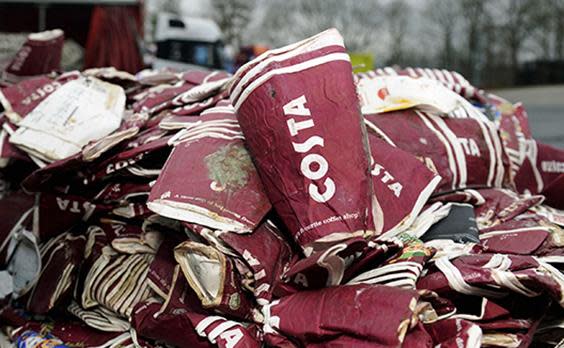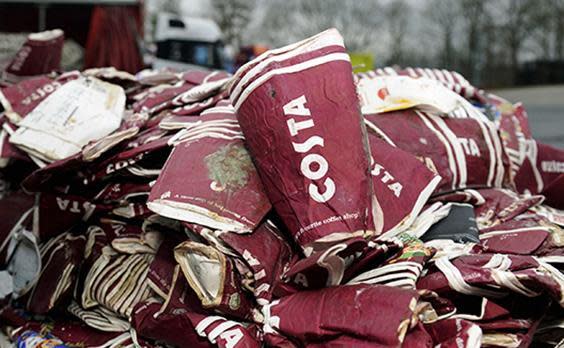Costa's approach to reducing waste is a start, but it's just one option out of many we should be implementing
Maybe we are having some effect. The Independent’s campaign to cut the use of disposable cups has caught the mood of the hour, and there have been a few clear wins, such as the cafe chain The Boston Tea Party banning these cups from June.
Good luck to them. But what may turn out to be the more significant advance has come from Costa, the largest coffee chain in the UK, and after Starbucks the second largest in the world.
It has just committed the UK end of the business to recycling 500 million cups a year by 2020 – the same amount it distributes. It is doing so by subsidising the waste collection companies, which in turn is leading the recyclers to invest in the kit to recycle the plastic and paper bonded cups – a more complicated business than it would be were they just made of paper.
Meanwhile, a Finnish company called Kotkamills has developed a new form of paper-board cup that will hold hot drinks without needing the plastic lining. These can then be recycled in the same way as regular paper, an established and cheap technology.
From an economist’s perspective this is fascinating. Here there is a clear social and economic problem that needs to be solved. When, more than a century ago, they were brought in as a hygienic substitute for people having to share the same mug, and it perhaps not being properly cleaned, they seemed a boon. Now, as their use has proliferated over the past 40 years, they have become a bit of a menace. And here are three different ways of tackling the problem.
First, you can change habits, the Boston Tea Party solution. You have people bring their own cups around with them. You can stop people buying bottled water – there is a shocking video of the piles of empty bottles in the streets after the London marathon.
You could even ban people from carrying drinks around with them in the street.
The second approach is to accept habits as they are, but use a combination of tax and subsidy to cope with them. In the case of Costa’s recycling scheme there is no tax as such because the company is carrying the cost, but there is a subsidy. A more explicit example of the tax version is the 5p payment for plastic bags in supermarkets, which has led to a change in habits, as in one above.
The third way forward is technology. You develop plastics that bio-degrade, or in this instance paper cups that don’t need a lining. Or, as The Independent has pioneered, you have a newspaper that has gone entirely online and so getting rid of transport, paper and printing altogether.
So which is best?
Well, they all are. There is no magic one-size-fits-all solution to most environmental issues. Those of us who were the last generation to use cloth nappies for our babies used to be sanctimonious at the waste involved with disposable ones. But the environmental cost of soaking the dirty ones in disinfectant and then washing them at 90 degrees was probably as bad as using disposables. (Actually I gather old-style nappies are coming back – but that is another story.)
In the case of coffee cups, though, it does not really matter which of the solutions comes to the rescue. It is a huge problem and needs to be tackled in whatever way is going to be most effective. Try ‘em all and see what works best.
That leads to a wider message. Environmental problems can be solved by a combination of conservation and technical advance. But there is a further element in the mix: common sense. Sometimes a disposable object is preferable for health or safety reasons but sometimes it is pure waste. Packaging has a purpose: to protect goods in transit and hence to save breakages. We just need to be more sensible, don’t we?

 Yahoo News
Yahoo News 

